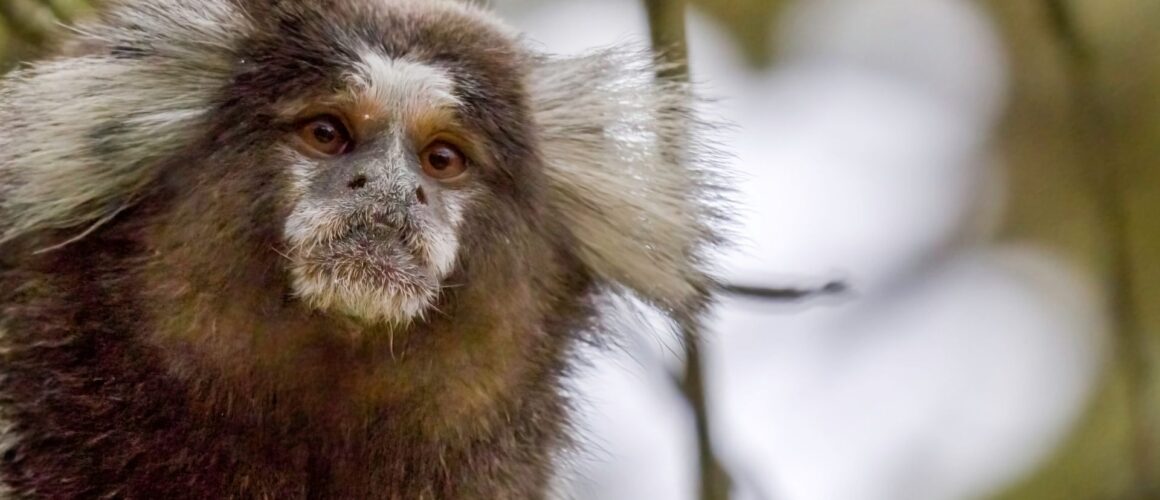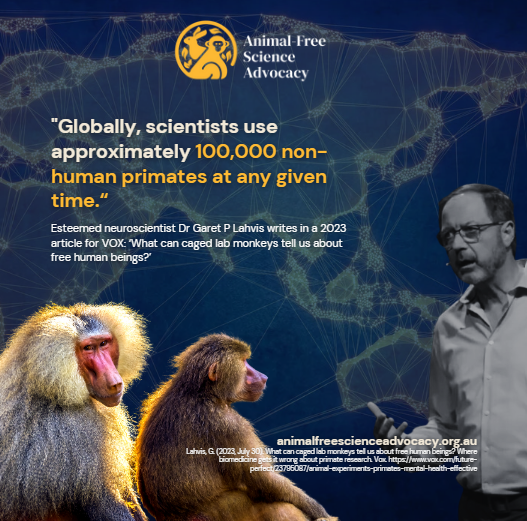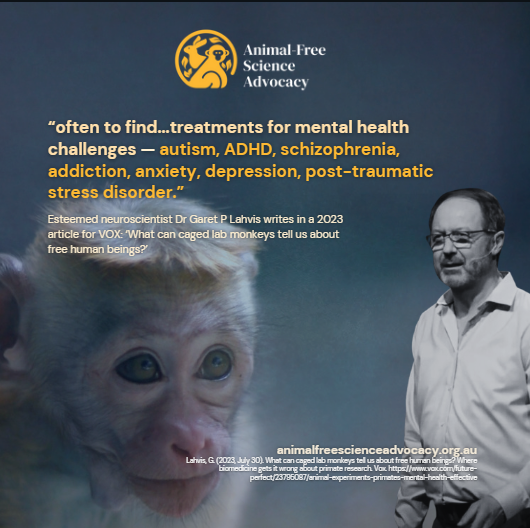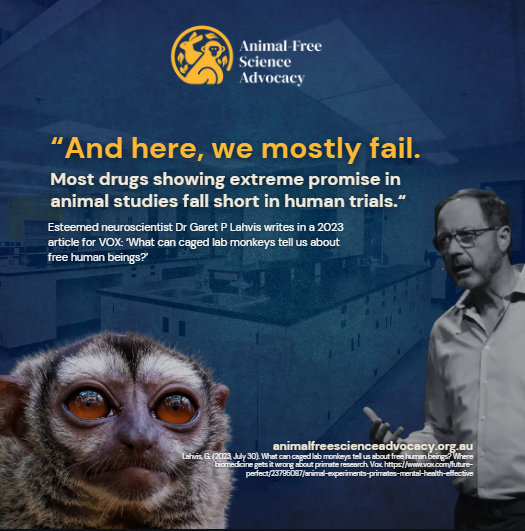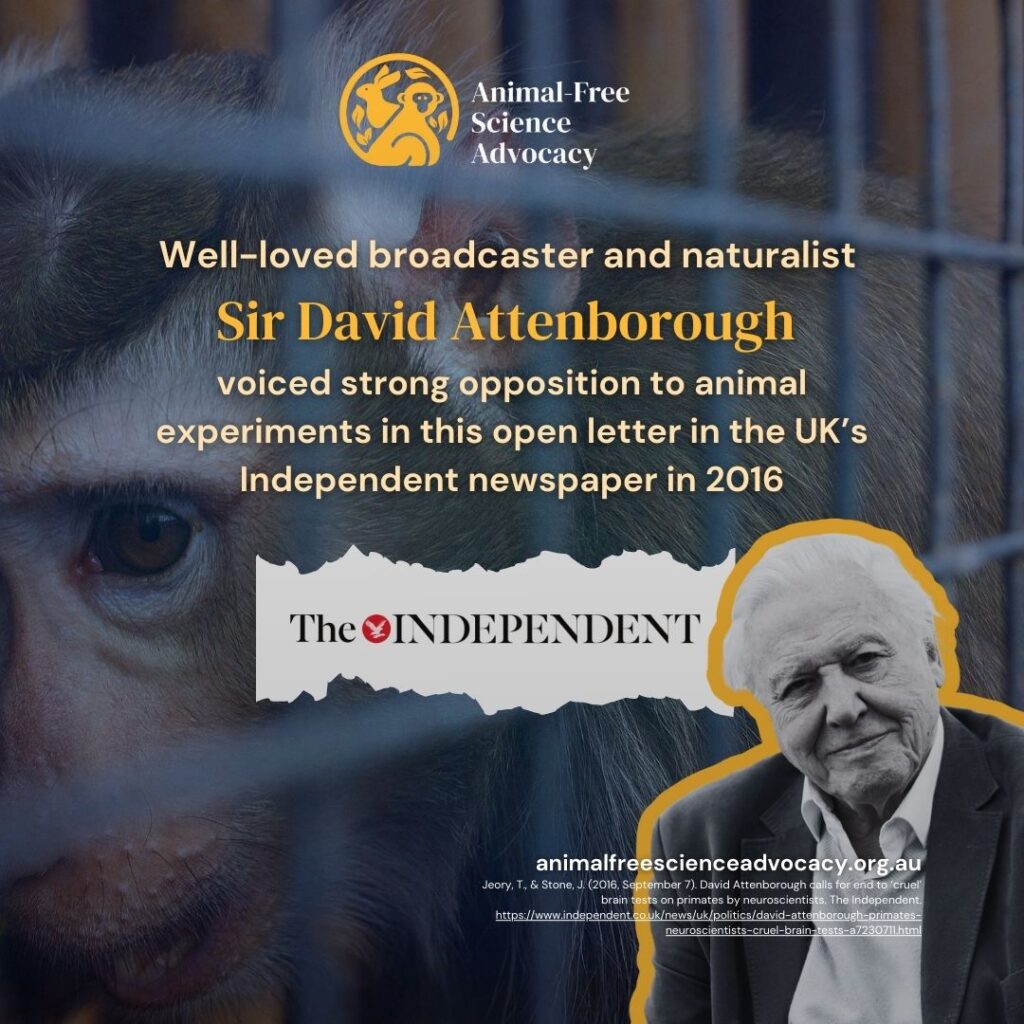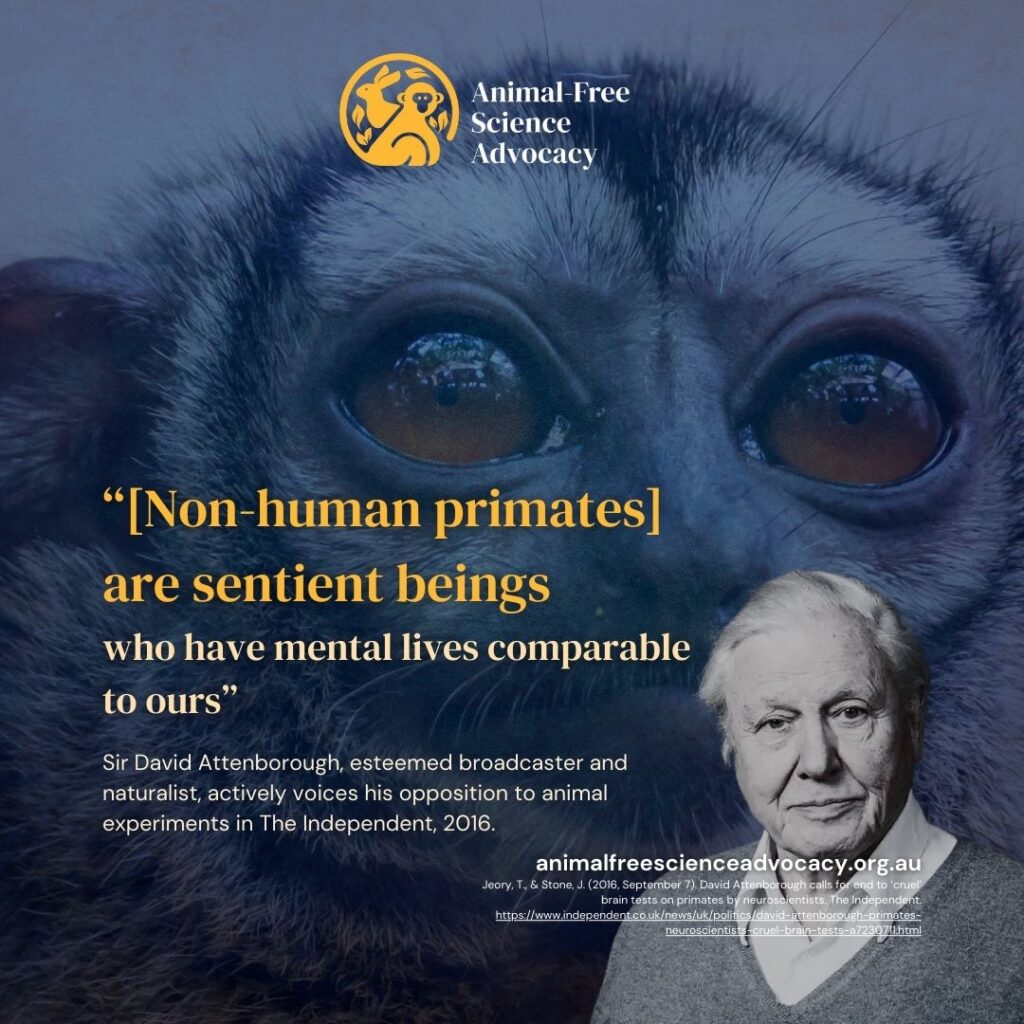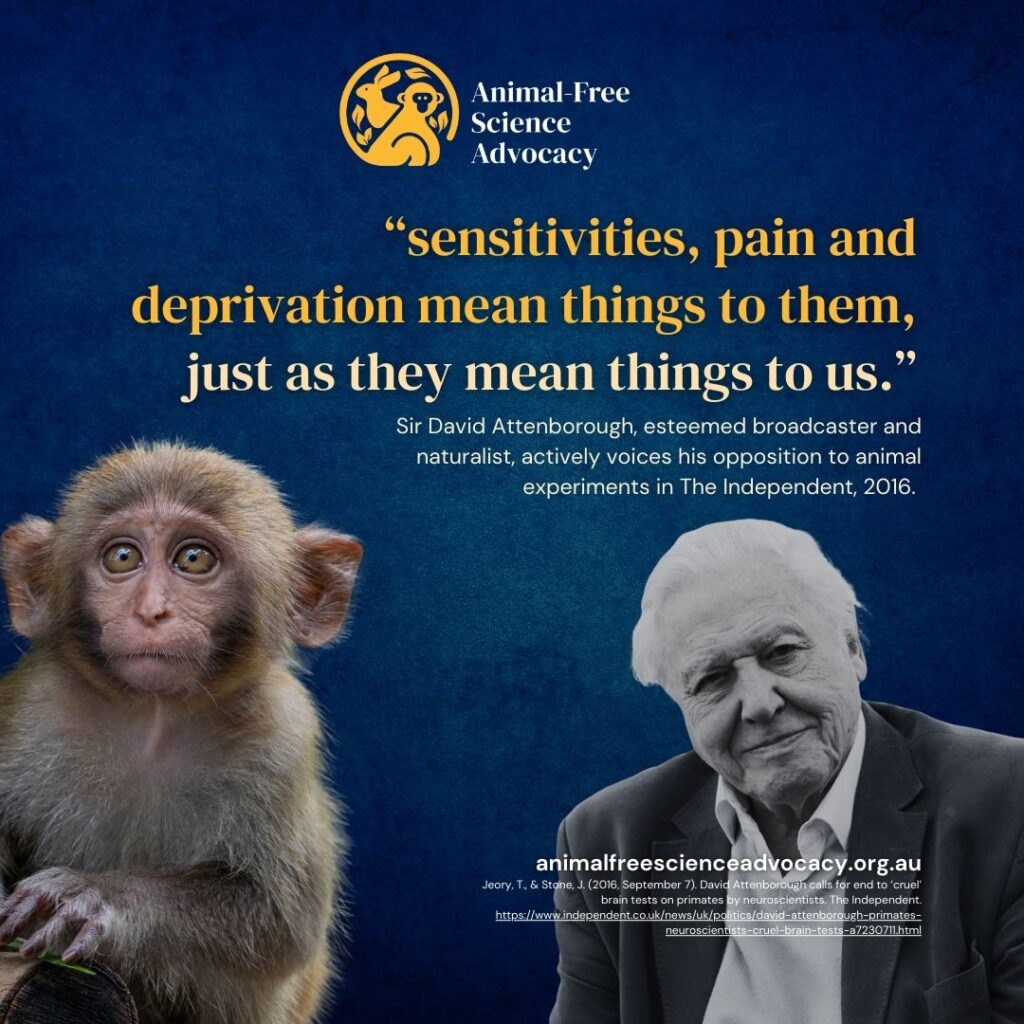In 2024 Dr Jane Goodall reinforced her strong stance against primate experiments on Australian television
In 2024, eminent leader in the field of primatology Dr Jane Goodall was a guest on Australia’s 730 report a current affairs programme on ABC Australia.
Presenter:
“You persuaded the National Institute of Health in the United States to stop doing experiments on apes. “Should we also stop doing experiments on monkeys like macaques or other animals?”
Dr Jane Goodall:
“Well I think it is morally wrong. And the great thing is, there are now alternatives to animal experimentation. The problem is that animal experiments are a part of a huge economic issue. There are people making their livelihoods out of looking after animals in cages. There’s a whole mechanism that makes money out of testing on animals. There are now so many alternatives that are much cheaper. And much more relevant to human #health. Because even #chimpanzees, with whom we share 98% of our DNA. Even they, although we can infect them with our #diseases, they don’t respond in the same way.”
Watch her on Youtube:
Dr Jane Goodall on why we should #BanPrimateExperiments: “There are now so many #animalfreescience alternatives that are much cheaper. And much more relevant to human #health” @animalfreesci Learn more #HonourMeWithAName #AnimalTesting #AnimalExperiments https://animalfreescienceadvocacy.org.au/message-from-dr-jane-goodall/
Dr Jane Goodall
Dr Jane Goodall, DBE, Ph.D is a pioneering primatologist and anthropologist. Renowned for her revolutionary study of chimpanzees in Tanzania, she founded the Jane Goodall Institute and serves as a UN Messenger of Peace. Her work has profoundly influenced global conservation and environmental advocacy.
“Once we admit that animals have personalities, minds and emotions and above all that they can suffer, both mentally and physically, then we must also admit that our use of animals for medical experimentation is, in almost all cases, ethically unacceptable. This view has led scientists to invent many medical tests that replace the use of animals. And for the most part such procedures are safer and more reliable. The main difference between humans and other animals is our sophisticated brain: let there be increased funding that we may use this gift for innovative research that will, and must, result in retiring all laboratory animals from lives of fear and pain as soon as possible. We need to move on.
“The amazing human brain has already discovered astonishingly innovative ways of improving medical research by replacing animals. Let science direct its collectively awesome intellect toward finding alternatives to the use of live animals in ALL procedures – as soon as possible. This should be supported by the scientific establishment and vastly increased funding should be found for it. It should be a goal for all civilised societies.
I am against animal testing. It is morally wrong and unacceptable and there are NOW better methods of testing that do not involve using live animals. Primate testing is occurring in Australia at major centres and universities such as the University of Melbourne, Queensland and Monash and we ask for your support to end this cruel practice.”
Dr Garet P. Lahvis
Dr Garet Lahvis was an associate professor and the graduate program director of behavioral neuroscience at Oregon Health and Science University. He is currently writing a book for the University of Chicago Press on his experiences with the limits of science, and of the scientific community, in addressing some of our most pressing biomedical issues. Follow him on X (formerly Twitter) at @GLahvis.
“Globally, scientists use approximately 100,000 non-human primates at any given time, often to explore highly nuanced questions, like finding risk factors and treatments for mental health challenges — autism, ADHD, schizophrenia, addiction, anxiety, depression, post-traumatic stress disorder. And here, we mostly fail. Most drugs showing extreme promise in animal studies fall short in human trials. We haven’t developed a new category of drugs for treating psychiatric illness in more than 50 years; new psychiatric drugs introduced over the same period have been modified versions of existing drugs.”
Lahvis, G. (2023, July 30). What can caged lab monkeys tell us about free human beings? Where biomedicine gets it wrong about primate research. Vox. https://www.vox.com/future-perfect/23795087/animal-experiments-primates-mental-health-effective
Professor Andrew Knight
Professor Andrew Knight, based in the UK, has championed animal advocacy, welfare, and ethics globally for decades. Starting with Australia’s anti-live sheep trade campaign in the 1990s, he shaped alternatives to invasive animal practices at Murdoch University and became a spokesperson for the Animal Welfare Party. Now at the University of Winchester, he leads the Centre for Animal Welfare and holds multiple veterinary specialist qualifications. His work has garnered international recognition and prestigious awards.
Read more
Carvalho, C.; Gaspar, A.; Knight, A.; et al. (2019). Ethical and scientific pitfalls concerning laboratory research with non-human primates, and possible solutions. Animals 9, 12. https://doi.org/10.3390/ani9010012
Sir David Attenborough
Sir David Attenborough, OM, CH, CVO, CBE, FRS, born on May 8, 1926, in London, England, is a celebrated broadcaster and natural historian. Known for his compelling documentaries like “Planet Earth,” he has dedicated his career to exploring and documenting wildlife and promoting awareness about the planet’s biodiversity and conservation.
David Attenborough spoke with the Independent UK in in 2016: “[Non-human primates] are sentient beings that have mental lives comparable to ours, and sensitivities, and pain and deprivation mean things to them, just as they mean things to us.” This statement highlights his stance on primate experiments. There are now more ethical and human-relevant ways to do research.
Jeory, T., & Stone, J. (2016, September 7). David Attenborough calls for end to ‘cruel’ brain tests on primates by neuroscientists. The Independent. https://www.independent.co.uk/news/uk/politics/david-attenborough-primates-neuroscientists-cruel-brain-tests-a7230711.html
Dr Richard Miller
Dr Richard Joel Miller, born in London, developed a passion for chemistry early, leading to a PhD from Cambridge University. A long-standing faculty member at the University of Chicago, then Northwestern University, he has published extensively in neuroscience and pharmacology. His latest work critiques animal experimentation, advocating for humane scientific methods. Richard is an advocate for a kinder world, residing in Chicago with his wife and two cats.
“As opposed to humans, monkeys don’t suffer from Alzheimer’s, Parkinson’s, Huntington’s diseases, or most other uniquely human neurological disorders. This means scientists must attempt to artificially induce these disorders in animals to “model” them for research purposes.
“Because the pathophysiology of these diseases is often poorly understood, generating such models in animals is basically impossible and inevitably produces few translatable results. (3) This applies especially to diseases like schizophrenia and depression, for which there is no clear neuropathology to model. Animal models for these disorders are basically scientific malapropisms.
“As a result, while drug development using animal models has a 90% failure rate, it’s even worse for neurological diseases. For example, the current failure rate for Alzheimer’s drugs is 99.6%.”
Miller, R. J. (2024, February 26). Moving past animal experiments to understand human neurological disease. Open Access Government. https://www.openaccessgovernment.org/article/moving-past-animal-experiments-to-understand-human-neurological-disease/173839/
Help us to end the cruel and unecessary use of primates in Australian science
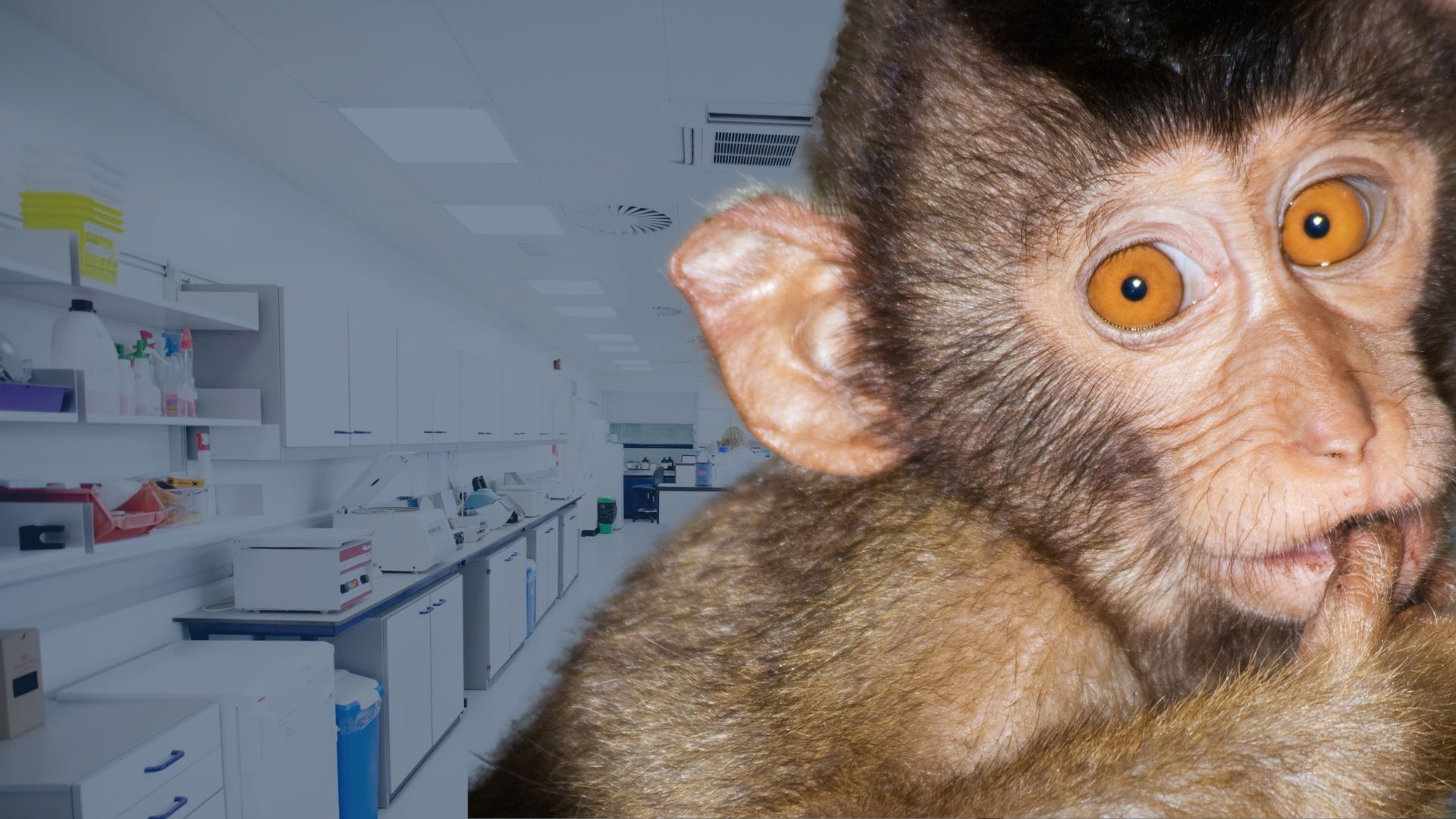
Honour Me With A Name Campaign
Learn more about our campaign to name and give dignity and respect to primates and their individual stories living in Australian labs.
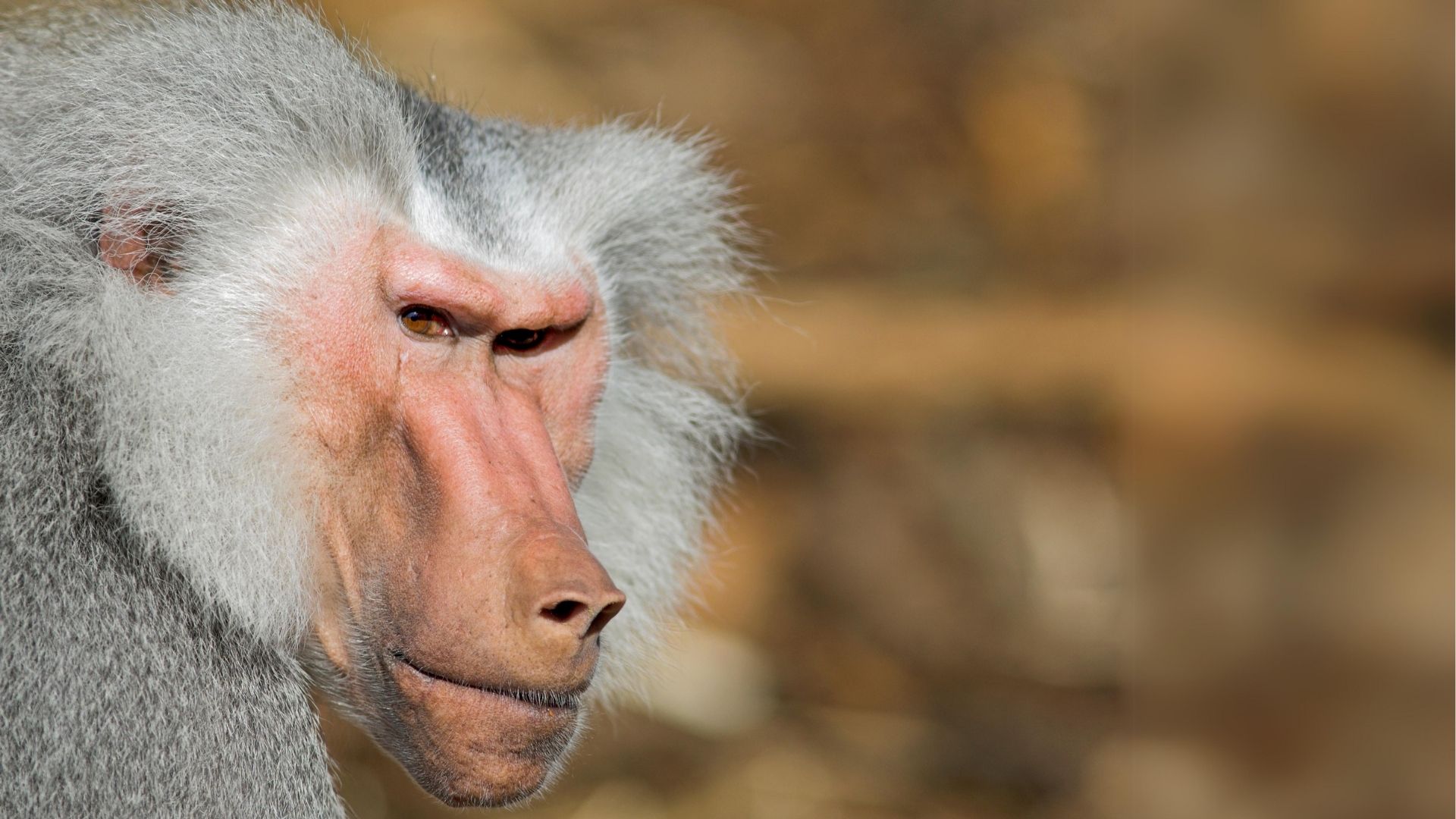
Primate Experiment Resources
Discover resources such as videos, articles and podcasts about current research on primates both in Australia and worldwide.
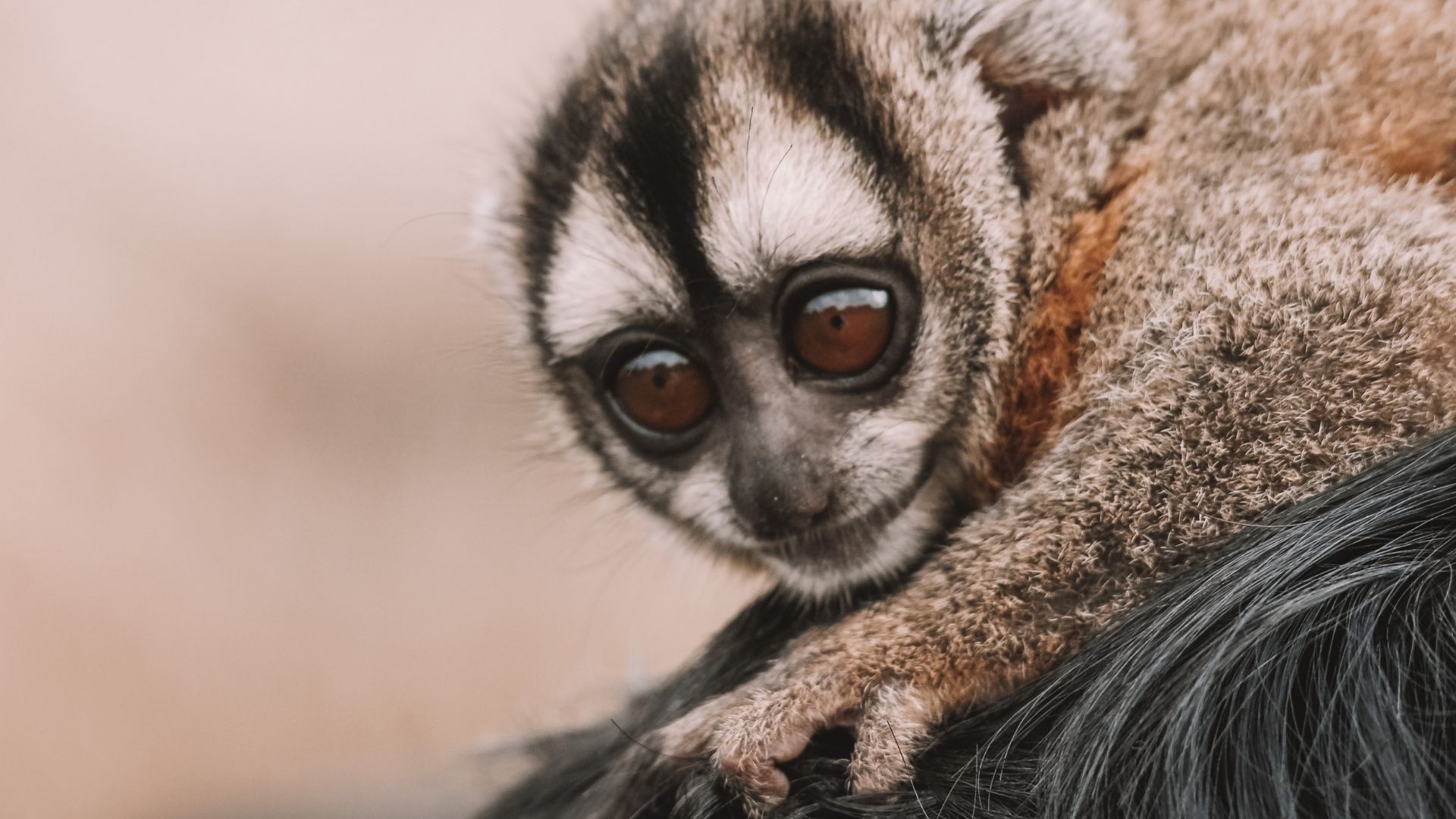
Take Action
Whether your support our campaign financially or not, there are many ways for you to take action and make a difference for primates in Australian laboratories.
